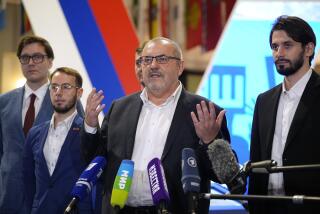Yeltsin Opens Up Race for Parliament : Russia: The main Communist, nationalist parties may take part, but not six organizations that ‘provoked’ rebellion.
- Share via
MOSCOW — President Boris N. Yeltsin narrowed his efforts to crack down on the political opposition Tuesday night with a decree that allows the main Communist and nationalist groups to take part in Russia’s Dec. 12 election of a new Parliament.
The decree excludes six organizations from the ballot on grounds that they “provoked and organized” the Oct. 3-4 armed rebellion that was crushed by an army assault on the Parliament building.
But it clears the way for 10 other parties suspended under an Oct. 3 state of emergency, which expired Monday, to register for the election campaign. Among them are the Russian Communist Party, the largest resurgent faction of the monolith that ruled the Soviet Union for seven decades until 1991.
“I am naturally more optimistic about the elections now,” Gennady A. Zyuganov, the leader of that Communist faction, said in a telephone interview. “There are a lot of attractive and talented people” now eligible to participate. “We have to unite.”
The fairness of the campaign--and the legitimacy of the Parliament to be elected--are still questioned by Yeltsin’s critics. A government ban on 15 rabid opposition newspapers is in force, while two mainstream anti-Yeltsin papers, including former Communist Party mouthpiece Pravda, will be allowed to reopen only if they change their names, top editors and ideologies.
Yeltsin’s media aide, Mikhail Poltoranin, also has announced plans to put about 2,400 newspapers financed by local legislatures across Russia under the control of local administrations loyal to the president.
Yet many of Yeltsin’s fiercest and best-known critics, including Zyuganov, right-wing nationalist leader Sergei N. Baburin and fascist firebrand Vladimir V. Zhirinovsky, announced plans last week to run for Parliament as individuals after authorities made it clear that anyone not charged with a crime could do so.
All 176 members of the new legislature’s upper house and half the 450 members of its lower house are to be elected on an individual basis. The importance of Tuesday’s decree is that it broadens the number of parties allowed to submit slates of candidates for the remaining seats.
Zyuganov said he was encouraged by the splintering of supporters of the president’s free-market reforms into three broad coalitions.
Most of Yeltsin’s Cabinet supports Russia’s Choice, led by radical reformer Yegor T. Gaidar, the first deputy prime minister responsible for the economy. But two other deputy prime ministers--Sergei M. Shakhrai and Alexander N. Shokhin--have broken away to form the Russian Party of Unity and Agreement. They favor more gradual reforms and greater autonomy for Russia’s regions.
A third group of reformers, independent and critical of the government, is led by Grigory Yavlinsky, a prominent economist who has announced plans to run for president in elections promised by Yeltsin next June.
On the broad spectrum between those reformers and the hard-line opposition are more than 100 parties scrambling to make coalitions. Among them is the Civic Union, a centrist alliance of prominent Soviet-era industrialists that was allied with former Vice President Alexander V. Rutskoi, now jailed for leading the rebellion.
In a bold move to take advantage of Yeltsin’s extraordinary powers and purge the Communist legacy, Moscow Mayor Yuri Luzhkov proposed Tuesday that the mummified body of Soviet founder V. I. Lenin be removed from its Red Square mausoleum and buried alongside his mother in St. Petersburg.
Luzhkov also urged Yeltsin, in a draft decree submitted for the president’s signature, to evict the remains of other Communist luminaries from crypts in the Kremlin wall behind Lenin’s tomb.
Andrei Ostroukh of The Times’ Moscow Bureau contributed to this report.
More to Read
Sign up for Essential California
The most important California stories and recommendations in your inbox every morning.
You may occasionally receive promotional content from the Los Angeles Times.













